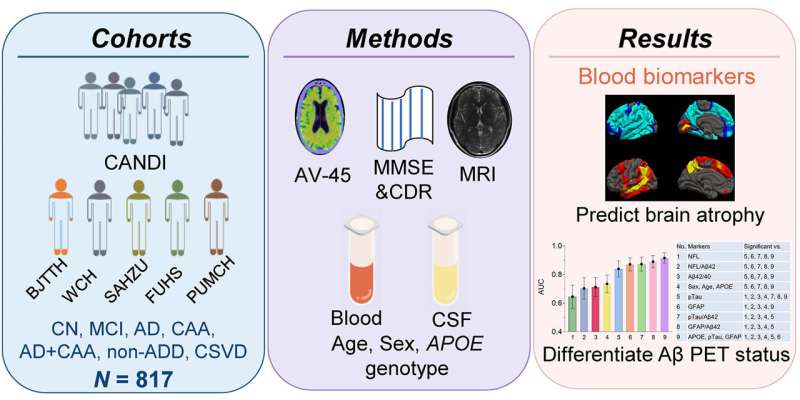This article has been reviewed according to Science X's editorial process and policies. Editors have highlighted the following attributes while ensuring the content's credibility:
fact-checked
trusted source
proofread
Blood-based biomarkers for Alzheimer's disease: Study in China

Discrepancies in diagnostic biomarkers for Alzheimer's Disease (AD) may arise from racial disparities, risk factors, or lifestyle differences. Moreover, there has been a lack of systematic and multicenter studies to evaluate baselines of the AD biomarkers in Chinese populations.
Thus, there is an urgent need for research to investigate the effectiveness of blood biomarkers for AD, specifically in the Chinese Han population, using a multicenter approach.
In a multicenter-based longitudinal study, the authors evaluated 817 blood samples from six different clinical centers. They measured plasma amyloid beta (Aβ)-40, Aβ42, phosphorylated tau 181 (pTau), total tau (tTau), serum neurofilament light (NFL), and glial fibrillary acidic protein (GFAP). Additionally, 18F-Florbetapir positron electron tomography and magnetic resonance imaging were also performed. The work is published in the journal Science Bulletin.
A combination of the APOE genotype with plasma pTau and serum GFAP demonstrated exceptional performance in distinguishing Aβ status.
Furthermore, baseline GFAP levels exhibited a strong association with cognitive decline over time and brain atrophy, with higher GFAP levels predicting a faster rate of neurodegeneration.
In summary, these results validate the practicality of blood biomarkers in the Chinese Han population, encompassing various regions within China. Additionally, they emphasize the potential of pTau and GFAP as non-invasive methods for detecting and screening AD at an early stage.
More information: Feng Gao et al, Blood-based biomarkers for Alzheimer's disease: a multicenter-based cross-sectional and longitudinal study in China, Science Bulletin (2023). DOI: 10.1016/j.scib.2023.07.009





















